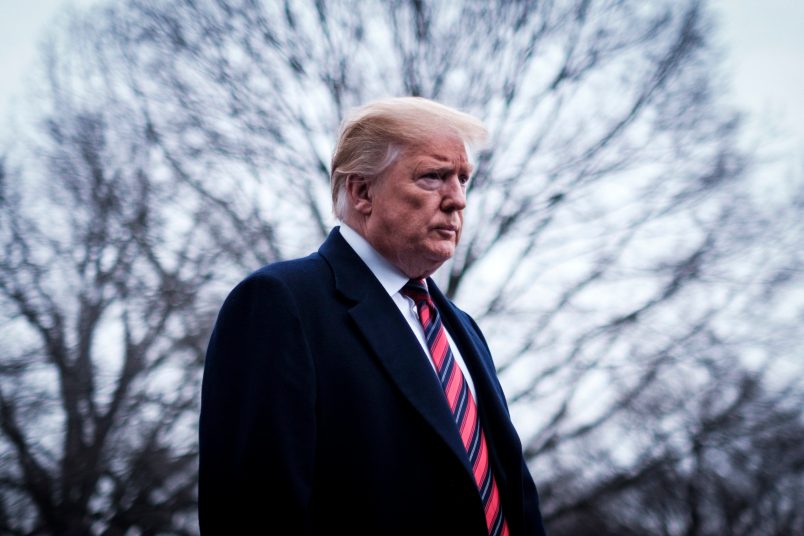New emails show how former President Donald Trump raced to begin a pressure campaign on the eventual replacement to then-Attorney General Bill Barr, pushing the new top official to boost his false claims of election fraud even before announcing that Barr would step down.
The New York Times first reported that Trump sent an email via his assistant to Jeffrey Rosen, the incoming acting attorney general, that contained documents which he said showed evidence of election fraud in northern Michigan, even after similar claims had already been tossed out by a federal judge just a week before in a lawsuit filed by one of Trump’s personal attorneys.
Details from the emails were revealed after investigators on the House Oversight Committee sent a letter to the Department of Justice last month requesting documents relating to President Trump’s efforts to overturn the results of the 2020 election prior to the Jan. 6 Capitol attack.
Two weeks after the northern Michigan correspondence, Trump followed up with another email through an assistant that included a draft of a brief that Trump wanted the Justice Department to file to the Supreme Court. It argued that state officials in Georgia, Michigan, Wisconsin, Arizona, Nevada and Pennsylvania had used the pandemic as “an excuse” to unconstitutionally revise or violate their own election laws and weaken election security, among other claims.
Kurt Olsen, a lawyer who advised in Texas attorney general Ken Paxton’s lawsuit that was swatted down earlier that month, prodded acting solicitor general Jeffrey Wall about meeting with Rosen about the brief which he said was “modeled after the Texas action.”
“Last night the President directed me to meet with AG Rosen today to discuss a similar action to be brought by the United States,” Olsen wrote in one email on Dec. 29. “I have not been able to reach him despite multiple calls/texts. This is an urgent matter.”
The efforts from Trump and his allies to pressure the incoming acting attorney general arrived in Rosen’s inbox around the same time that Trump’s chief of staff Mark Meadows was asking Rosen to examine unfounded conspiracy theories about the election.
Meadows urged Rosen in a series of emails on Dec. 30 to investigate a group of outlandish claims including one that suggested people in Italy had used military technology and satellites to remotely switch votes for Trump to votes for President Joe Biden. He also pressed for Rosen to look into allegations of “signature match anomalies” in Fulton County.
“Can you get Jeff Clark to engage on this issue immediately to determine if there is any truth to this allegation,” Meadows wrote of the Fulton County claim in another email to Rosen dated Jan. 1.
Rosen later complained of the request to his deputy, Richard Donoghue: “Can you believe this? I am not going to respond to the message below,” he wrote.
The documents provide insight into how Rosen managed the intensifying pressure to submit to examining the big lie advanced by Trump and his allies.
Rosen also made clear to Donoghue in one message that he wouldn’t engage with the Italy conspiracy theory.
“I learned that Johnson is working with Rudy Giuliani, who regarded my comments as an ‘insult,’” Rosen wrote in the email, referring to one of the proponents of the theory, former CIA employee Brad Johnson who had posted about the theory in statements and videos online. He added that he also wouldn’t agree to meet with then-Trump lawyer Rudy Giuliani to discuss the matter or arrange a meeting for Johnson with the FBI.
“Asked if I would reconsider, I flatly refused, said I would not be giving any special treatment to Giuliani or any of his ‘witnesses’, and reaffirmed yet again that I will not talk to Giuliani about any of this,” Rosen continued.
Rosen is now negotiating to give an interview to investigators from the House Oversight Committee, the Senate Judiciary Committee and others.
House Oversight Chair Carolyn Maloney (D-NY) has said the documents “show that President Trump tried to corrupt our nation’s chief law enforcement agency in a brazen attempt to overturn an election that he lost.”
“Those who aided or witnessed President Trump’s unlawful actions must answer the Committee’s questions about this attempted subversion of democracy,” she said in a statement. “My Committee is committed to ensuring that the events leading to the violent January 6 insurrection are fully investigated.”







BUT HIS EMAILS!!!
Ok discobot…the above is a complete sentence
Has donnie been indicted yet? (taps foot)
Kudos to Rosen for not going along with Trump’s attempt to steal the election.
Still, when I read his huffy responses saying that he won’t even reply to certain emails, I wonder why he isn’t completing the triangle and taking action about the election interference conspiracy coalescing around him.
Shouldn’t the Italy conspiracy be moved to a Vatican conspiracy in order to fill the hearts of evangelicals?
ETA. Biden is a practicing RC.
Responding to Giuliani the way he did I would’ve thought would get Rosen fired.by trump.
Don’t the House and Senate have subpoena powers? Seems they have the power to simply say, “Testify or go to jail.” Why are they always “negotiating” with people for their testimony?
Real question.